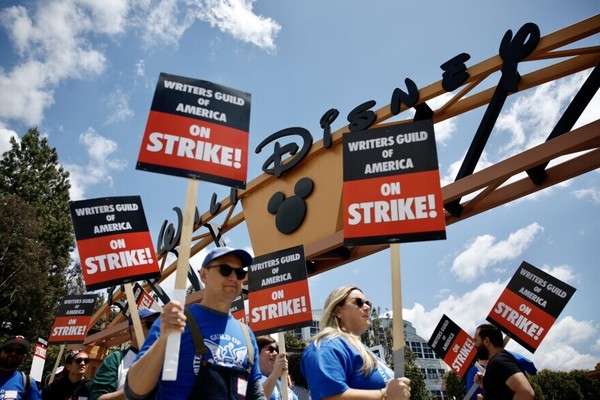
After a week of hard work, the weekend is a much needed refuge — free of stress and worries — even if only for a brief moment. While some prefer to go outside and bask in the sun, I prefer to stay inside and enjoy the comforts of my shows. Millions of people around the world undoubtedly share the same sentiment. It’s all thanks to writers that we have an endless stream of content to choose from. Just as we paid attention to the stories they wrote, we should also pay attention to their plight as the Writers Guild of America (WGA) goes on strike.
As always, the main point of contention between Hollywood studios and the WGA is compensation. Over the past decade, we saw streaming services skyrocket in popularity. We went from following a couple of TV shows over the course of weeks, if not months, to being able to binge-watch as many shows as we want over the weekend using only our mobile devices. However, as Hollywood’s profits increased, little of it was reflected in the compensation writers received. The strike is hoping to achieve better terms for residual pay — a type of royalties that writers receive from reruns — that has grown in importance in the age of streaming.
In addition, with the advent of AI technologies in media, the writers are being proactive and are trying to set up safeguards. The WGA are trying to negotiate in their agreement a stipulation that ChatGPT or other Language Learning Models (LLM) cannot be used in the writing process of a show. Not only all credited writers must be human, the WGA also insist that none of the work of their writers be used to train LLMs and generate any form of literature. The Alliance of Motion Picture and Television Producers (AMPTP) essentially ignored the urgency of the issue by countering with annual negotiations that take into account technological advancements.
On the opposite side, Hollywood-based studios are saying that now is not the time to increase pay, especially given that the past year saw streaming giants lose customers for the first time in a decade. However, those were consequences of the decisions Hollywood chose to make. Instead of improving the quality of the shows being produced by compensating writers better, Hollywood chose to dump billions in favor of quantity. As a result, thousands of writers are left underpaid and undervalued, while a comparable number of shows are left to rot and to never have dedicated viewers.
Given the long production periods for Hollywood content, it’s fair to assess that we consumers won’t be affected directly for several more months. However, if there is anything we can learn from the last notable writers strike, which was back in 2007, is that all shows will decrease in quality in the end. Though I was too young to notice it then, beloved shows such as Breaking Bad, The Office, and How I Met Your Mother had to alter their stories due to a sudden decrease in the number of episodes they could produce as a result of the strike. While the aforementioned shows somehow managed to withstand the consequences of the strike and remain popular to this day, the same cannot be said for others that more drastically dipped in quality. The same can end up happening to the shows we love today if the studios and writers remain at an impasse for a long time. Moreover, this strike affects the entire industry — cameramen, stylists, caterers are all left without a steady source of income. Though there is unity across the workers of Hollywood, it cannot be understated how tumultuous and difficult the following months will be for them.
Whether or not it affects us, we shouldn’t be apathetic to the plight of workers and other professions. Thousands of people are left without any income during this strike, so it’s important that we remain aware and show support in any way we can, in order for a resolution to be achieved sooner rather than later. In addition to that, it is also key that we understand how vital this negotiation is for the future of the show-writing profession. Streaming looks like it will be here to stay, and AI is all-but-guaranteed to disrupt the field; for the profession to survive, writers must receive fair compensation with those factors in mind. Otherwise, the ripple effect on the future of the entertainment industry will be unimaginable.

